 Petzlover
Petzlover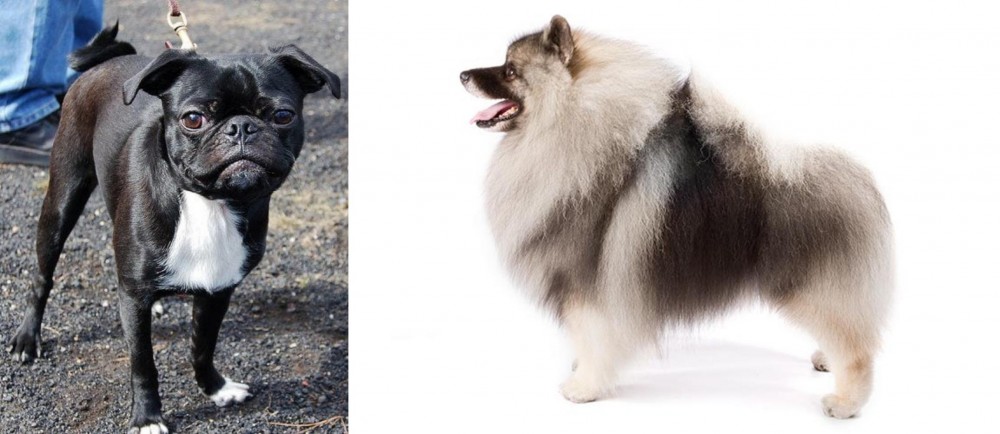 Bugg is originated from United States but Keeshond is originated from Netherlands. Bugg may grow 10 cm / 3 inches shorter than Keeshond. Bugg may weigh 7 kg / 15 pounds lesser than Keeshond. Both Bugg and Keeshond has almost same life span. Both Bugg and Keeshond has same litter size. Both Bugg and Keeshond requires Moderate Maintenance.
Bugg is originated from United States but Keeshond is originated from Netherlands. Bugg may grow 10 cm / 3 inches shorter than Keeshond. Bugg may weigh 7 kg / 15 pounds lesser than Keeshond. Both Bugg and Keeshond has almost same life span. Both Bugg and Keeshond has same litter size. Both Bugg and Keeshond requires Moderate Maintenance.
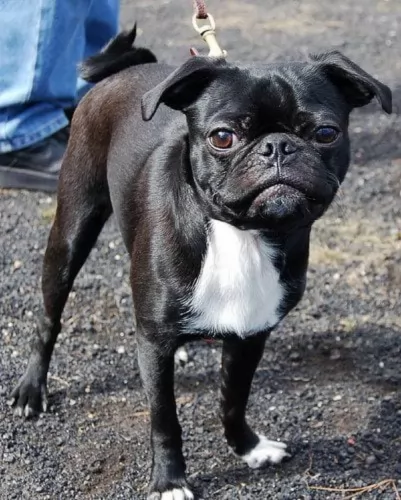 The Bugg is generally a cross between a Boston Terrier and a Pug. There is no clear history in terms of who started this hybrid dog that was recognized initially be the IDCR or International Designer Canine Registry in 2009. This very cute little dog has become increasingly popular in a very short period of time. Crossing these two breeds created a small dog that loves to sit in your lap as well a romp and play.
The Bugg is generally a cross between a Boston Terrier and a Pug. There is no clear history in terms of who started this hybrid dog that was recognized initially be the IDCR or International Designer Canine Registry in 2009. This very cute little dog has become increasingly popular in a very short period of time. Crossing these two breeds created a small dog that loves to sit in your lap as well a romp and play.
At this time the Bugg is recognized by several of the hybrid and designer registries and clubs. This would include in addition to the IDCR:
 Keeshond is the term used for German Spitzes and although many American references have it that the Keeshond originated in the Netherlands, some say the dog originated in Germany and is a member of the German Spitz family.
Keeshond is the term used for German Spitzes and although many American references have it that the Keeshond originated in the Netherlands, some say the dog originated in Germany and is a member of the German Spitz family.
The Club for German Spitzes was founded in 1899. The Nederlandse Keeshond Club was formed in 1924. The Keeshond is also referred to as ‘The Smiling Dutchman’.
It was in the 17th and 18th centuries that the Keeshond was used greatly as a watchdog, appearing in England in the late 1800s, but after the turn of the 20th century, Mrs. Wingfield Digby of Dorset, England and Mrs. Alice Gatacre, a Dutch breed authority, living in England, stirred interest in the breed with their kennels.
An English breed Club was formed in 1926, and the first Keeshond was registered with The American Kennel Club in 1930.
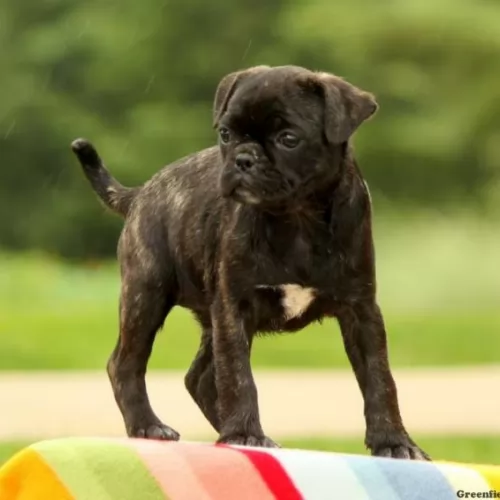 This cross between the Boston Terrier and Pug can have several different looks depending upon whether the individual dog resembles the Pug or the Boston more. Some usual but not always physical characteristics include curly tails, droopy ears and a stocky body in a small dog. They usually have soft, straight coats. Most Buggs look more like the Boston than the Pug although they have the more smashed muzzles and shorter legs of the Pug. The heads are round with almond shaped eyes.
This cross between the Boston Terrier and Pug can have several different looks depending upon whether the individual dog resembles the Pug or the Boston more. Some usual but not always physical characteristics include curly tails, droopy ears and a stocky body in a small dog. They usually have soft, straight coats. Most Buggs look more like the Boston than the Pug although they have the more smashed muzzles and shorter legs of the Pug. The heads are round with almond shaped eyes.
 The Keeshond is a medium-sized dog and a member of the Spitz group of dogs. He stands at 43 – 48cm in height and weighs 14 – 18kg.
The Keeshond is a medium-sized dog and a member of the Spitz group of dogs. He stands at 43 – 48cm in height and weighs 14 – 18kg.
He has a 2-layered, dense coat which is fairly long, straight and coarse and colors are grey, silver, black and cream. His undercoat is a very light cream color. He has erect ears, a fairly shop muzzle and a feathery, plumed tail which curves over his back.
The hair on his legs is fairly short accompanied with some feathering. A typical marking-feature of the Keeshond is the dark line which runs from the outer corner of each eye to the lower corner of each ear. It's what gives the dog his well known keeshond expression. The eyes of the dog are dark brown.
The Keeshond, just like other Spitz dogs, are playful, affectionate, friendly and eager to please. He is intelligent too and will respond well to training and socialization.
He makes a wonderful family pet as he is friendly and playful with children, loving all their games. He gets on well with other pets too. He is a social dog, thriving on being with his human family, wanting to participate in all family activities.
They are sensitive, loving pets and become very attached to their owners. They have even been used as comfort dogs in rescue situations, as they bond so well with people.
He makes a good watchdog too with his loud bark which he uses to deter intruders. He may well be a good watch- and guard dog but he isn't an aggressive dog.
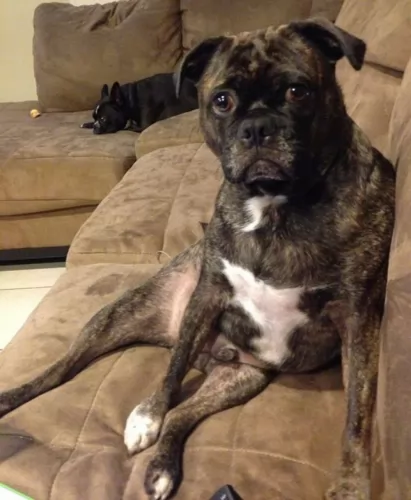 This crossbreed is easily trainable and highly intelligent. They might be stubborn like the Boston or devoted like the Pug. They can have characteristics of both parents and be loving, playful lapdogs. They love to play with children, but they can be territorial like the Boston. The Bugg is a small dog with a big attitude. They are affectionate and sweet, friendly towards people and other animals. Since the Boston and the Pug have very similar characteristics and temperament, you can have a pretty good idea what your Bugg will be like.
This crossbreed is easily trainable and highly intelligent. They might be stubborn like the Boston or devoted like the Pug. They can have characteristics of both parents and be loving, playful lapdogs. They love to play with children, but they can be territorial like the Boston. The Bugg is a small dog with a big attitude. They are affectionate and sweet, friendly towards people and other animals. Since the Boston and the Pug have very similar characteristics and temperament, you can have a pretty good idea what your Bugg will be like.
 The Keeshond, with his thick double coat, loves to be outdoors in cool weather. He won't be there too long however, because he will be missing his human family. He is such a social dog, craving human company and therefore isn't a dog to be put out in the backyard and left day after day.
The Keeshond, with his thick double coat, loves to be outdoors in cool weather. He won't be there too long however, because he will be missing his human family. He is such a social dog, craving human company and therefore isn't a dog to be put out in the backyard and left day after day.
He loves games and being totally involved with his human family. Look after your Keeshond well – he is a companion dog - and you will find him to be a most exceptional friend of yours.
 With good food, fresh water, exercise and lots of interaction with your Keeshond, he can reach 12 to 14 years of age.
With good food, fresh water, exercise and lots of interaction with your Keeshond, he can reach 12 to 14 years of age.
No matter how healthy your dog is, he can still get ill, but the chances are less likely when he is feed nutritionally. Nonetheless look out for hip dysplasia, bloat, ear infections, skin rashes and eye diseases.
This is a problem in the lens of the eye. Your dog has a cloudy look to the eye. A cataract can occur when the cells are damaged. A disease such as diabetes can also cause a cataract and high blood sugar levels can change the metabolism of the cells in the lens.
The lens should be crystal clear, but with a cataract, the vision of the dog is obscured. It can cause blindness. Thankfully, cataracts aren't painful and most times dogs with cataracts can still see. There is the option of surgery to remove them too.
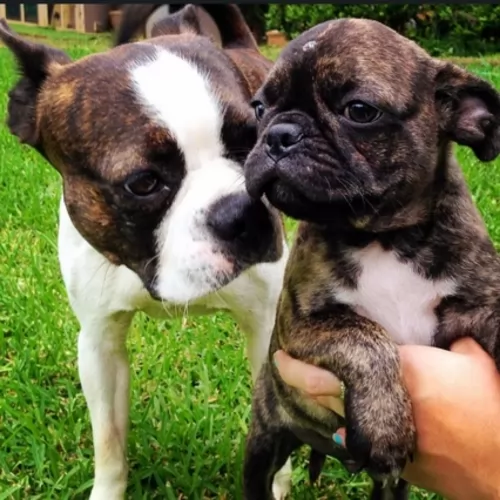 Buggs love to eat and will anything you give them and some things that you don’t. They can become obese very easily so watch their food intake. These small dogs should be eating food made for small dogs. Feed them only ¾ to 1 and ½ cups of dry food per day split into two meals.
Buggs love to eat and will anything you give them and some things that you don’t. They can become obese very easily so watch their food intake. These small dogs should be eating food made for small dogs. Feed them only ¾ to 1 and ½ cups of dry food per day split into two meals.
The Bugg can inherit health problems from either the Boston or the Pug, or they may be healthier than either parent breed. Both of these parent breeds are given to Brachycephalic issues due to their mashed faces. They could face respiratory issues or eye issues because of this.
The Bugg is a very energetic and playful dog. They love to run, play and go on walks. Just one walk or play session per day is enough exercise for this little dog. You can easily have your play time inside if you don’t have a fenced yard. Because of their faces and breathing issues do not let them get overheated.
 With his double coat, your Keeshond will need regular brushing to get rid of all those loose hairs. He is a dog which doesn't have that typical dog odor about him so bathing him is discouraged. Too much bathing irritates a dog's skin and dries it out.
With his double coat, your Keeshond will need regular brushing to get rid of all those loose hairs. He is a dog which doesn't have that typical dog odor about him so bathing him is discouraged. Too much bathing irritates a dog's skin and dries it out.
Check the inside of his mouth and make sure that his teeth are in a healthy state. If you are unsure, speak to your vet about dental hygiene as bad teeth won't only cause pain and discomfort for your pet, the teeth can affect his immune system and other body parts.
Check his claws too and have them cut when they become too long. When they are long they can hook on things and injure the sensitive area of the paws.
The Keeshond is a sturdy dog, loving all the activities and games that his family are involved in. He will love to be your walking companion and looks forward to his walk every day.
He is such a playful, adventurous dog and is always willing to join you in new games. Never put him in your back garden and forget about him, as this will make him ill and depressed. He must be part of the family to be healthy and happy and relies on you to include him in all your activities. He can live in the city or the countryside but will require being exercised wherever he is.
Top quality dry kibble will work for your Keeshond. If you want to keep him bright eyed and bushy tailed, mix in some quality home-made food too such as cooked chicken, rice and vegetables. You can also try to sometimes include a little bit of raw meat as well.
He is an active dog and will need a diet high in protein. Also, his thick coat needs to be maintained, and apart from regular brushing, look for quality dog foods that have Omega-3 fatty acids in them so as to maintain the skin and coat of the dog. Make sure he always has access to fresh, cool water.